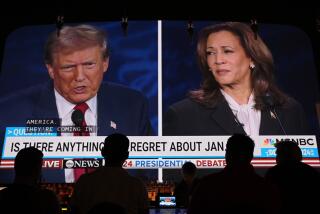Corporate Funding Ban Survives
- Share via
WASHINGTON — Corporations, even small ones that earn no profits and use their money to promote causes, can be barred from directly funding federal campaigns, the U.S. Supreme Court ruled Monday.
The 7-2 decision strongly reaffirms the view that the government can bar the flow of corporate money to politicians and their campaigns.
Some legal experts viewed the ruling as good news for defenders of the broad campaign finance law that will be challenged in the high court in September.
The ban on corporate funding of campaigns is nearly a century old, Justice David H. Souter noted Monday.
In 1907, President Theodore Roosevelt sought to free federal elections from the grip of the big railroads and banks. He won passage of a law that banned “any corporation whatever” from contributing to a federal campaign.
“Today, as in 1907, the law focuses on the ‘special characteristics of the corporate structure’ that threaten the integrity of the political process,” Souter said. “In barring corporate earnings from conversion into political ‘war chests,’ the ban was and is intended to prevent corruption and the appearance of corruption.”
His opinion refused to allow an exception for an incorporated, antiabortion group in North Carolina.
Lawyers for the National Right to Life Committee challenged the rules that ban nonprofit corporations such as the North Carolina Right to Life Inc. (NCRL) from funding candidates for federal office.
The group’s lawyers said the group was a political advocacy organization that raised money through bake sales and walk-a-thons.
U.S. District Judge Terry Boyle agreed with the challenge and ruled that the ban violated the group’s free-speech rights. (President Bush has nominated Boyle to the U.S. Court of Appeals, but the nomination has stalled in the Senate.)
Boyle’s ruling was upheld by the U.S. 4th Circuit Court of Appeals on a 2-1 vote. “These organizations (such as North Carolina Right to Life) lie at the expressive heart of our political life,” wrote Judge J. Harvie Wilkinson, a potential Bush nominee to the Supreme Court.
However, U.S. Solicitor General Theodore B. Olson, representing the Federal Election Commission, appealed and won a reversal in the Supreme Court in FEC vs. NCRL.
Souter said the ban on corporate giving applies not just to General Motors, but to nonprofit corporations such as the National Rifle Assn., AARP and the Sierra Club.
If it were otherwise, wealthy people could funnel money through cause-oriented corporations and thwart the ban on unlimited donations, he said.
Justices Clarence Thomas and Antonin Scalia dissented, saying free-speech rights outweigh the government’s interest in banning such contributions.
Last year, Congress moved to close the so-called “soft money” loophole by prohibiting political parties from accepting big-money contributions from corporations, unions and wealthy people.
In September, the high court will hear 12 lawsuits that challenge this law on free-speech grounds.
More to Read
Sign up for Essential California
The most important California stories and recommendations in your inbox every morning.
You may occasionally receive promotional content from the Los Angeles Times.














